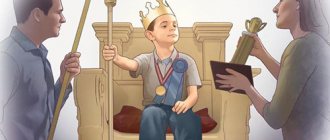Old age crisis - what is it?
In psychology, the crisis of old age is the age period associated with the transition from maturity to old age. The word “crisis” itself has an interesting explanation. It means a turning point or sharp turn that leads to an improvement or deterioration in life. It turns out that the crisis of old age is a time of adaptation to new circumstances, to one’s age and changed living conditions.
Old age is conventionally divided into 3 stages:
- 60-75 years - aging;
- 75-90 years old - old age;
- from 90 years and older - longevity.
They are otherwise called early, middle and extreme old age, respectively. A person is already retiring, receiving a new social status, looking for other activities, since most often he cannot work. Although there are those who continue to work for several more years. It is worth noting that the boundaries of these periods are indicated approximately. In old age they are blurred.
Each of the above stages of aging has its own characteristics:
- In early old age, overcoming the crisis of old age is not difficult. Therefore, it is not considered critical. This is a kind of continuation of late maturity, when a person has already realized himself both in the profession and in the family.
- Middle old age is akin to adolescence in adolescence. A person reconsiders values and priorities, looks at the past years differently, and realizes that the end of life has begun. Psychologists consider this period critical because it is associated with depression, an acute sense of uselessness and loneliness, and loss of any interests. In especially severe cases, suicidal tendencies appear.
- If the personal crisis is successfully overcome, extreme old age or longevity occurs. This period is associated with senile dementia. It is rare for people over the age of 90 to boast a clear mind and the ability to reflect. The main characteristics of this period are: lack of fear of death, infantilism, egocentrism, childish spontaneity and a tendency to fantasize.
It is difficult to say exactly what a person will be like during a crisis. One thing can be said - in old age his personal characteristics will sharpen. Introverts experience this time the most difficult.
Methods of psychological adaptation
For the psychological adaptation of older people, time perspective is very important. This prospect is provided by the opportunity to study and gain employment .
Although older people tend to be more oriented towards the past, when planning their work activities it is also possible to be oriented towards the future. This perspective allows an elderly person to make certain plans, relieves depression and fear of death, helps to overcome illnesses, as it gives confidence in the future and opens up ways to achieve real goals.
It is important to make older people feel needed again, interesting interlocutors, to reveal hidden potential and increase interest in life. This is the basis for the work of social and charitable institutions. They create various clubs, sections, training seminars, interest clubs and thematic events. All these events are aimed at one thing - to help a person adapt and find a new meaning in life.
Another method of psychological adaptation can be the biographical method.
, which is considered quite effective for motivating the life activity of people who have entered late adulthood.
Using this method, an elderly person gets the opportunity to share his life experience, talking about the peculiarities of his destiny and at the same time can understand how his past influenced the formation of his present.
The process of remembering itself, even without its in-depth psychological analysis, can give a very strong psychotherapeutic effect and contribute to the emergence of a positive self-perception.
Thus, the formation of a positive perception of old age, the elderly person’s awareness of a sense of social demand, active and socially significant participation in the life of society helps to reduce the negative phenomena of the aging process.
Classification
American psychologist Erik Erikson believes that the crisis of old age is the eighth crisis in a person’s life. Its main feature is an acute psychosocial conflict, during which the individual completely rethinks his life.
The crisis of old age and its psychological content are of a purely individual nature. But Erickson identified 3 methods of adaptation that are most common:
- Happy old age. It comes for those people who coped with the crisis almost painlessly. They are distinguished by the presence of willpower, a balanced character and a strong nervous system. They can safely be called harmonious individuals who accept with dignity what happens to them. These people still look at the world around them with interest, remember the positive moments of life, and treat their age with love. In addition, they experience peace and are not afraid of death.
- Unhappy old age. Affects people who have distressing chronic illnesses. They are characterized by anxiety, lack of self-confidence, touchiness, vulnerability, and lack of meaning in life. Very often, patients think about suicide or ask for euthanasia. In most cases, they remain alone, feel helpless, and again and again remember and experience past grievances. Because of this, the crisis of old age is prolonged.
- Psychopathological old age. With such aging, it is almost impossible to cope with the crisis. It is observed in people who suffer from depression or hypochondria, neuroses, and senile dementia. With their own hands they create problems and conflict situations for themselves and those around them. They are also afraid of being left alone, without the support of relatives in a nursing home. The main feature of this type of old age is hatred of age.
If an elderly person was able to survive the crisis of old age, he gains wisdom and a sense of integrity with time and society. Otherwise, he experiences deep dissatisfaction with life, despair and hopelessness. He understands that nothing can be changed.
Psychological studies of age-related changes
The situation has developed in such a way that the percentage of elderly and senile people in the population is increasingly increasing. There is a crisis of social values and ideals of Soviet society, in which today's elderly people grew up and grew old.
Therefore, research in the field of life activity of older people, understanding their place and role in society is becoming relevant. There are many approaches to identifying types of aging and old age. Let's look at some of them.
F. Giese proposed to distinguish three types of old people:
- negative type , denying any signs of old age;
- extroverted type , recognizing the onset of old age, but coming to this recognition through external influence and by observing the surrounding reality, especially in connection with retirement (observation of grown-up youth, differences with them in views and interests, changes in the situation in the family);
- an introverted type , acutely experiencing the aging process. Such people develop dullness towards new interests, revived memories of the past, weakened emotions, and a desire for peace.
I. S. Kon gives a classification of types of old age depending on the nature of the activity with which it is filled:
— The first type is active, creative old age . People, having parted with professional work, continue to participate in public life, live a full life, without feeling any disadvantage.
- The second type of old age is also distinguished by good social and psychological adaptability, but the energy of these people is aimed mainly at organizing their own lives - material well-being, recreation, entertainment and self-education, for which they previously did not have enough time.
- The third type, in which women predominate, finds its main application of strength in the family. They have no time to mope or be bored, but their life satisfaction is usually lower than that of representatives of the first two types.
— The fourth type is people whose meaning in life has become health care , which stimulates quite diverse forms of activity and gives a certain moral satisfaction. However, they tend to exaggerate the significance of their real and imaginary illnesses.
The classification proposed by D. B. Bromley is quite widespread in the world psychological literature. She identifies five types of personality adaptation to old age:
1. constructive attitude towards old age:
- elderly and old people are internally balanced,
- have a good mood,
— satisfied with emotional contacts with people around them;
- moderately critical of themselves and at the same time very tolerant of others and their possible shortcomings;
- do not dramatize the end of professional activity, have an optimistic attitude towards life;
- the possibility of death is interpreted as a natural event that does not cause sadness and fear;
- show neither aggression nor depression, have lively interests and permanent plans for the future;
- thanks to their positive life balance, they confidently count on the help of others;
— the self-esteem of this group of elderly and old people is quite high.
2. Dependency relationship . These are the people:
- subordinate to someone, dependent on a marital partner or on one’s child;
- do not have too high expectations in life and, thanks to this, willingly leave the professional environment;
- the family environment provides them with a sense of security, helps them maintain internal harmony, emotional balance, and not experience hostility or fear.
3. Defensive attitude . It is characterized by:
- exaggerated emotional restraint;
- some straightforwardness in your actions and habits;
- the desire for “self-sufficiency” and reluctant acceptance of help from other people;
- avoidance of expressing one’s own opinion - such people have difficulty sharing their problems and doubts;
- sometimes a defensive position towards the entire family: even if there are some claims and complaints against the family, they do not express them;
- a protective mechanism against the fear of death and deprivation - activity “through force”, constant feeding by external actions;
- leaving work with great reluctance and only under pressure from others.
4. Attitude of hostility towards others . People with this attitude:
- aggressive, explosive and suspicious;
- strive to “shift” the blame and responsibility for their own failures onto other people;
- do not quite adequately assess reality;
— distrust and suspicion make them withdraw into themselves and avoid contact with other people;
— in every possible way drive away the thought of moving to retirement, because use a mechanism for relieving tension through activity;
- prone to acute reactions of fear, they do not perceive their old age, and think with despair about the progressive loss of strength;
- have a hostile attitude towards young people, sometimes with the transfer of this attitude to the entire “new, alien world”;
- this kind of rebellion against one’s own old age is combined in these people with a strong fear of death.
5. Attitude of hostility towards oneself . These types of people:
- avoid memories because there were many failures and difficulties in their life;
- passive, do not rebel against their own old age, only meekly accept what fate sends them;
- the inability to satisfy their need for love is the cause of depression, self-esteem and sadness;
- experience a feeling of loneliness and uselessness;
- They assess their own aging quite realistically - death is interpreted as deliverance from suffering.
All these types of old age and attitudes towards it do not exhaust the entire variety of manifestations of behavior, communication, activities of an aging person, and the diversity of individuals. They only provide an understanding of the variety of possible behavior options for a person approaching old age.
See also:
Law of the Moscow Region dated December 4, 2014 N 162/2014-OZ (as amended on October 25, 2018) “On some issues of organizing social services in the Moscow Region”
Causes of the elderly crisis
Any personal crisis is characterized by the inability to live as before. The individual changes both mentally and physically. Psychologists have identified a number of factors that contribute to these changes:
- A person leaves his job, turning from a respected employee into a practically powerless member of society, most often receiving a meager pension.
- Retirement occurs, and as a result, social status changes.
- Activity gives way to inaction and boredom.
- Society considers older people to have spent their full potential. It's like they're missing out on life.
- There is a lot of free time, but there is nowhere to spend it. The frantic rhythm of life has slowed down to a disgraceful pace.
- The circle of contacts is narrowing. Children grow up and move away, start their own families, colleagues forget, friends get sick and die.
- Unhappy thoughts lead to depression, a feeling of uselessness and hopelessness.
- Diseases are getting worse, physical health is rapidly deteriorating.
- The person realizes that he has become dependent on other people. And who wants to be a burden?
E. Erikson, mentioned above, believes that the crisis of old age is a consequence of the discrepancy between goals and desires and the way life went. During this period, a person analyzes the years he has lived, looks at what he has achieved, whether he received what he needed. And often the analysis does not show anything good. Realizing that the past cannot be changed, the elderly person first experiences confusion and then disappointment.
Afterword
Thus, in order to survive the crises of old age, you need to reevaluate your own “I”, develop indifference to deteriorating health and aging, accept the thought of death and get rid of the fear associated with it.
Taking time off from work gives you a lot of free time, but it doesn't mean the end of life. You just need to find a hobby and hobby that will be interesting now. I have a lot of time for myself and self-care. Yes, health is deteriorating, the body is aging, but you need to accept this and rationally take care of your health. To experience this easier, you need to realize the significance of your life, feel respect and interest from other people.
The senile crisis is more like an intrapersonal crisis, rather than an age-related crisis. This is a period of identity, of existential crisis. Acceptance of the changes that occur (as in adolescence) determines the ease of later life and crisis.
Symptoms of the crisis
Mental and physiological processes occurring in the body slow down. It becomes more and more difficult for an elderly person to cope even with simple actions.
Speed reaction
Perhaps the most important sign of an old age crisis. The nerve impulse moves more slowly, and the processing of information entering the brain slows down. E. Ya. Sternberg, who founded the school of gerontopsychiatrists, found that reduced mental activity leads to a narrowing of perception. As a result, problems with concentration begin. The mental state also worsens due to decreased tone and limited mobility.
Memory
Legends can be made about memory surprises. But in more than 90% of older people it remains in excellent condition. Yes, it may be more difficult for them to remember what is happening now. However, they remember the past very well. Surely you have heard the stories of veterans about the Great Patriotic War. Have you noticed how accurately and in chronological order they describe those events? At the same time, they mention the names and surnames of their colleagues and name settlements.
Such memories help to cope with the crisis of old age. They allow older people to return to their youth again and again, to relive pleasant moments once again. All this gives pleasure and calms, improves mood.
Attention
The situation with attention is usually worse than with memory. Have you noticed how difficult it is for older people to concentrate? They are usually absent-minded and confuse the order of events. And they understand that something is wrong with them, they suffer from it, thereby increasing the manifestations of the crisis.
Intelligence
In this matter, not everything is so clear. According to many, intellectual capabilities decrease in old age. But in reality, everything is completely different. In Seattle (USA), a massive longitudinal study was conducted over 20 years. According to him, a person’s intelligence does not change throughout his life. However, it needs constant development. If your professional activity was associated with mental work, the ability to think clearly will remain for a long time. Otherwise, it is recommended to do regular activities such as crossword puzzles.
Motivational-need sphere in old age
The results of recent studies show that aging does not in any way affect the list of human needs. In many ways, the list remains the same as previous years of life. Only the structure of the list and the hierarchy of needs can change. For example, in the sphere of needs, the need for security, avoidance of suffering, independence and autonomy comes to the forefront. The needs for self-realization, a sense of community, love and creativity are relegated to more distant plans.
During old age, age-related developmental tasks can be summarized as follows:
- adaptation to bodily and psychophysical age-related changes;
- maintaining health;
- adequate perception of old age and opposition to negative stereotypes;
- role reorientation, which consists of abandoning old role positions and searching for new ones;
- reasonable distribution of time with the aim of more rational and targeted use of the remaining years of life;
- opposition to affective impoverishment (isolation of children, loss of loved ones);
- search for new behavioral forms;
- the desire to comprehend life lived and internal integrity.
Stages of development of the old age crisis
Each person experiences a crisis differently. Individuals with an active lifestyle and correct self-esteem may not even notice it. Those who suffer from self-doubt will feel all its manifestations. And if measures are not taken in time, laziness, apathy, and then depression appear.
In its development, the crisis of old age goes through 3 stages:
- Reassessment of values, new acquaintance with the changed inner self.
- Awareness of one's own helplessness, deterioration of physical health, loss of strength.
- Awareness of the inevitability of aging.
The manifestations of individual stages have individual characteristics for a particular person.
Aging as a psychosomatic process
Psychosomatics is a science that studies the influence of emotions on the body and the development of various diseases. Nature has established that the human body, starting from the age of 25, physically begins to slowly but surely fade away. This is a natural biological process, but individual characteristics of a person can bring this new period closer.
The manifestation of chronic negative emotions, for example, anxiety, stress, suppressed unspoken aggression, have a serious impact on a person’s internal and external health:
- wrinkles and age spots appear;
- pressure rises;
- the heart and blood vessels are damaged;
- the rate of gray hair appearance increases;
- the body's defense mechanisms are suppressed;
- telomeres (parts of chromosomes whose length is directly related to life expectancy) are shortened;
— the number of free radicals increases (and, as a result, oxidative stress increases);
- the level of the longevity hormone - Klotho - decreases (its reduction directly affects the occurrence of atherosclerosis and osteoporosis).
Conventionally, we can distinguish 3 types of old age: physical (decreased activity and various diseases), social (limited contacts) and psychosomatic.
If we talk in more detail about the last aspect, then its striking features include:
- Lack of positive emotions. To feel comfortable, it is important for a person to periodically receive approval of his strengths from others. In science, this term is called “psychological stroking.” And a person needs nourishment with new emotions and impressions no less than vitamins.
- Negative destructive thoughts;
- Self-flagellation;
- Feelings of guilt, inferiority, unfulfillment;
— Self-hypnosis associated with future negative events;
— Manipulation of others using a non-existent disease;
- “Childish” behavior.
Physical, social and psychosomatic old age may not coincide with each other. Their greater or lesser manifestation depends on a person’s lifestyle, level of intelligence, desire to develop and not give up.
Online training in Anti-Age medicine Learn the intricacies of anti-aging medicine from anywhere in the world.
For the convenience of doctors, we have created the Anti-Age Expert online training platform: Lectures from our educational programs are consistently posted here, and are accessible 24/7. Doctors can study the materials as many times as necessary, ask questions and discuss interesting clinical cases with colleagues in special chats. Find out more
Personality types in old age
Psychologists identify several personality types characteristic of older people:
- Constructive. He is distinguished by his balance, optimistic outlook on life, critical attitude towards himself, and high self-esteem. An older person does not become depressed about retirement, but instead makes plans for the future.
- Dependent. Such individuals adapt well to new circumstances. They are family-oriented, prone to subordination, and have no ambitions either professionally or personally.
- Protective. A person almost never shows emotions, is straightforward in his actions, and always speaks the truth and to the point. Under any circumstances, strives to be independent.
- Self-incriminating. This type of personality is characterized by passivity, belief in predestination, depression, and reluctance to solve problems. A person looks at the world through a negative lens. He is so lonely that he considers death the solution to all difficulties.
There is also an aggressive-accusatory personality type. It is extremely difficult for such people to cope with the crisis of old age. They always blame others for everything, are overly impulsive, suspicious, and have an inadequate perception of themselves and the world around them. In addition, they deny the very fact of aging and are very afraid of dying.
Markers of psychological old age
Psychological age includes the totality of a person’s subjective feelings of his age, behavior and actions. Therefore, very often the psychological age does not coincide at all with the mark in the passport. Some even at 70 years old find hobbies, enjoy life, explore the unknown, while others, after 30 years, begin to age with incredible force.
Psychologists have identified markers of psychological old age, thanks to which a person can understand that his energy is directed not in a creative, but in a destructive direction.
Here they are:
· Relationships with time.
The first indicator is the thought that all interesting events are behind us and that there is nothing attractive in the future. Psychologically, a young man is not afraid to make plans, while an old man lives only in memories, slowing down his development.
· Attitude towards your limitations.
Psychological old age occurs when a person puts self-pity and limitations at the forefront (“I will never…”, “I no longer have the strength,” “I should have done it earlier”). Psychologically, a young man believes in his strengths and capabilities at any age.
· Degree of development of emotional competence.
Emotional competence is the ability to “switch” from oneself to other people, not to judge, and to experience feelings of gratitude. It has been proven that kind and cheerful people have different hormonal and neurochemical processes, thanks to which the face does not become “senile” for a long time.
Anti-Aging Medicine Seminars Gain knowledge based on evidence-based medicine first-hand from the world's leading experts.
As part of the Anti-Age Expert Modular School, in-person two-day seminars are held every month, where the intricacies of anti-age medicine are revealed to doctors of more than 25 specialties. Find out more
Differences between the old age crisis in men and women
The first difference lies in the time frame. According to the WHO European Bureau, old age for women begins at 55 years, and for men at 61.
The second difference relates to the purpose of the two sexes. A woman is the keeper of the home. She is usually not subject to serious demands regarding professional and social activities. In the case of men, the opposite is true. They are assigned the role of breadwinners of the family, breadwinners. Therefore, their career almost always comes first. Retirement is perceived as a personal tragedy. Because of it, the crisis of old age is intensifying.
The third difference concerns loneliness. It is easier for a woman to adapt to him. She spends her free time taking care of her family, home, grandchildren, or communicating with friends. It's more difficult for men. They often get caught up in thinking about the meaning of life, their purpose, etc. They constantly analyze whether they did the right thing in a given situation.
Brief conclusions
Thus, the main psychological problem of aging is associated with a personal crisis and determining one’s place in life. Those who perceive aging not as the end, but as a new stage in life, lead an active life, and their emotional background is not subject to serious cataclysms. But if you or your relative are prone to reflecting on the past, then it is important to connect additional levels of care from loved ones, and sometimes professional psychological help.
Ways to deal with the old age crisis
The main thing is not to isolate yourself. There are enough factors that make you feel lonely and useless. But if we take them all into account, the crisis will not only not go away, but will drag on for many years.
There are other tips from psychologists:
- Don't blame yourself. Establish contact with your inner self. Analyze the past, present and future, and then accept it as it was, is and will be accordingly. Understand that you cannot change what has already happened. So is there any point in regretting it? Listen to your feelings. Maybe there is something you wanted to do, but never dared to? Believe me, now is the time for this.
- Find a hobby. If you stay at home all the time, the old age crisis will not go away. Of course, TV and the Internet will help you cope with loneliness for a while. But they will soon cause boredom and irritation. So find something interesting to do. This could be creativity, walks in the fresh air, playing sports with peers. Why not try learning a foreign language? All this will help you eradicate bad thoughts and find new friends.
- Look for new acquaintances. There is a saying: an old friend is better than two new ones. This is partly correct. But not in the case of the old age crisis. A person may become sad if one of his friends or acquaintances starts talking about the past. That is why it is better to make new friends. Remember, perhaps one of them has already overcome the crisis and will be happy to share practical advice with you.
- Engage in social activities. Volunteering will help you feel like a needed person again, a full-fledged member of society. You can visit orphanages and homes for the elderly, helping people who find themselves in difficult life situations. Another good option is to visit animal shelters.
- Travel. If possible, visit a country you have always dreamed of visiting. This is one of the most effective ways to take your mind off the crisis and regain your joy in life. If this is not possible, arrange a tour of nearby cities or visit remote areas of your city.
And, perhaps, the most important advice is to improve your relationships with family and friends. Don't be upset with them if they don't seem to spend enough time with you. Also, don't neglect them. People in a state of crisis in old age tend to become self-absorbed and not notice what is going on around them. Therefore, forgive insults and always make contact. Practice intimate conversations, sit with your grandchildren, spend time with your family. This is an important requirement for those who want to overcome the old age crisis as soon as possible.
Old age is a stage in our life
Without a doubt, old age is a stage of our life, and a very important, final one at that. At this stage, for both men and women, the perception of one’s age becomes a very important aspect.
How to determine a person's age? We can say that it is very simple - you just need to open your passport! But only if we are talking about biological age. What if it’s psychological? This is where we run into questions. How to define it? What markers should I look for? What are the psychological features of aging?











